Opinion - Nobody Does It Better!
16th July 2007
As part of the special 30th Anniversary coverage of
"The Spy Who Loved Me", MI6 asked cast & crew members, authors
and Bond aficionados to explain why Nobody Does It Better....
Sir Roger Moore - On His Favourite
Outing...
MI6 asked Sir Roger Moore why The Spy
Who Loved Me was his favourite of his seven outings as
James Bond.
Lewis Gilbert directed. He really is the dearest, sweetness
man. We got on famously as we both share the same, daft sense
of humour.
It was a great script by Christopher Wood. The sets designed
by Ken Adam were fantastic, particularly the 007 stage.
The locations were delightful and exotic. Then there was
the wonderful Lotus car, and the wet bike - it was
the first time it was ever seen on screen, and I got to
ride it!
Richard Kiel was one of the best henchmen ever - so
good in fact we brought him back. Curt Jurgens was one
of the best villains, and one of the nicest men you could
meet. Such a professional. Mrs Ringo Starr played my leading
lady. What else can you ask for? The shoot was pure fun
from start to end.
|
|
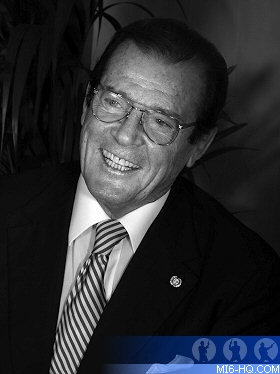 |
Christopher Wood - On Keeping The British End Up...
One memory? All right, let’s go for this: intrepid and
in dinner jacket, Roger trudges doggedly across the endless desert
wastes, Barbara Bach, never lovelier in long black evening dress,
gamely struggling on behind. Up a steep sand hill and - 007’s
trousers fall down.
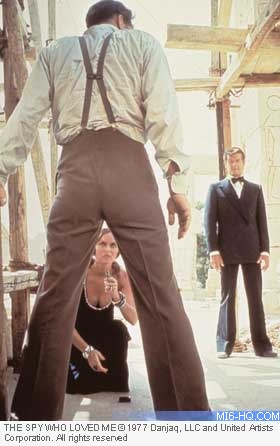
|
|
We were watching rushes and, of course,
we all laughed. Something we did with astonishing frequency
considering the pressures, strains and tribulations of
The Spy Who Loved Me production process: Cubby’s
first independent Bond after the break-up with partner
Harry Saltzman, Michael Wilson’s first 007, the franchise
rumoured to be in trouble, the production threatened with
a closing down injunction, the writer sued for plagiarism,
the studio hating the script etc., etc.
Despite all this my memories are nearly
all of laughter and good times. As if we, the participants,
knew what we were doing would become the most successful
Bond ever and many peoples all time favourite - certainly
my children’s. Yes, I’ll go with Roger dropping
his trousers. Looking back over the years it sums up for
me what fun it all was.
Christopher Wood is an English screenwriter
best known for the James Bond films The Spy Who Loved Me
(1977 with Richard Maibaum) and Moonraker (1979), as well
as for the two novelizations based upon these films. He is
currently published by 21st
Century |
John Grover - On Editing 007 For The First Time...
I had a call from John Glen to come and join him in the cutting
rooms at Pinewood Studios to help sort out a mass of film he
had shot in Baffin Island for the opening title sequence of ‘A
Spy Who loved Me’.
A number of stunt men baddies chasing a daredevil skier playing
James Bond who then skied over a precipice with a parachute on
his back in the colours of the Union Jack. The final jump was
shot by many cameras but only one of them got the full shot that
was used in the film. This could not be done today because
of Health and Safety regulations, it would be done with
green or blue screen and the skier would be attached by
wires, all would be sorted out in a computer. On ‘The
Spy Who Loved Me’ most of the stunts were for real,
only the boat going over the falls was a composited shot,
purely because the model boat sent over the falls got stuck
and even a helicopter sent up to blow it off did not work.
TSWLM was the first Bond film I worked
on and was to be the start of a long happy time with
Eon Productions. Cubby Broccoli and Lewis Gilbert were
always
ready to accept ideas from anybody on the crew to make
the film more outrageous or impossible. Bad language
was unacceptable but some violence and sexual innuendo
was
OK. Family entertainment was their motto, grandparents
could always take their grandchildren to see the films
to enjoy them together.
‘In’ jokes were good fun,
we tried them in rushes, the first showing of the film
shot the day before, one example was the Lara theme from
Dr Zhivago put over the alarm clock, I had been an assistant
on Zhivago and had a small musical box given to me that
played the theme, I recorded it and put that into rushes,
that little joke stayed in the film and even Maurice Jarre
got royalties on the bit used in the film! As did John
Williams from the door entry code when we used the Close
Encounters theme.
John Grover began his run of Bond films
as an assembly editor on "The Spy Who Loved Me".
He performed the same role on "Moonraker", then
as supervising editor on "Octopussy", and editor
on "For Your Eyes Only", "The Living Daylights" and "Licence
To Kill". |
|
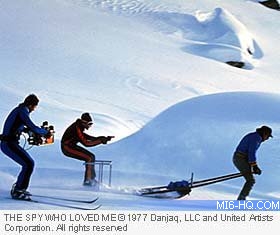
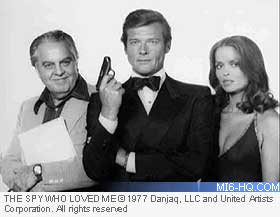
|
Shane Rimmer - On Bathing With Bach...
There was this scene with Barbara Bach having a shower, it was
behind frosted glass but anyone who just happened to be able
to walk seemed to wander in during the taking of that scene.
This went on for at least an hour. It was amazing. People who
hadn't been there all of a sudden were having a look. It felt
like theatre - we had an immense audience participating in this
scene.
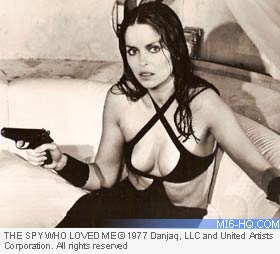
|
|
She was great! I don't know if she realized
that she'd packed the studio with people from every department.
She got together people who hadn't seen each other for
months and months. The distraction was enormous that day;
there was quite a bustle of people.
I remember the great cordiality - that
was the right word for Roger Moore. The star makes or breaks
the atmosphere on the production. He made it! He was one
of the most genuine people. There wasn't a veneer on him
at all. There quite easily could have been, he was running
very high at that point. But he gave fellow actors so much
room to do what they wanted to do. |
You didn't feel that
you were under any kind of inspection from him - you could just
let go. It was a very free production in that sense. I've always
admired Roger for that - he was one of the guys and he preferred
being that way. It was a delight.
Shane Rimmer was born in Toronto, Canada. After a successful
career in Canadian Radio & T.V. he was brought to England
in the late 50’s by Director Richard Lester to appear in
an ITV Network Special. He stayed on to appear in 50 films in
the U.K. & Europe.
Charlie Higson - On Falling Out Of Fashion...
Unfortunately by the time
the Spy Who Loved Me came out, ten years later, I had kind of
grown out of Bond. This was 1977 and
I was a teenage punk obsessed with Taxi Driver. Bond was for
kids. The films had become too silly. I was too cool for all
this nonsense.
TSWLM is actually better than I imagined
at the time, and one of the best of Roger Moore’s
outings, but Moonraker following on its heels was a low
point and cemented my temporary divorce from 007. Moore
has been dismissed as camp and lightweight, but looking
back he was a very good light comedian and had something
of Cary Grant’s appeal. As long as you don’t
treat his films as classic/authentic James Bond, but more
as classy and outrageous family entertainment they hold
up pretty well. Moore was a million miles from Connery
and a million miles from Daniel Craig but he was still
an essential
part of the Bond world.
|
|
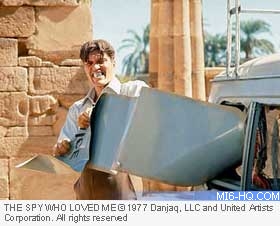
|
Charlie Higson is a writer, actor and comedian. He is author
of the Young Bond series
of novels. The fourth adventure, Hurricane
Gold, is due out in September 2007.
Gary Giblin - On Bond's Return To The Top...
I distinctly remember my first encounter with The Spy Who Loved
Me. It was at the Northgate Mall multiplex in Cincinnati, Ohio,
and it was the first Bond film to which I could actually drive
myself. Hurray! No more chaperoning parents! My best friend
and I bought our tickets, perused the posters (exotic Arab
beauties and a steel-toothed assassin), and went inside.
Two
and a half hours later I left the theater and felt as if I
could do anything. I had seen a film that was truly exhilarating,
with breathtaking locations, gorgeous girls, super stunts and
amazing special effects. To top it off, Roger Moore seemed
just about perfect as Bond, alternately cool, comic or concerned
as the situation required. At that moment, I idolized the actor
as much as the character he played. Unlike Sean Connery, who
had to shave off his moustache and put on a wig to play Bond,
Moore always looked—and acted—the part. And The
Spy Who Loved Me was his crowning achievement.
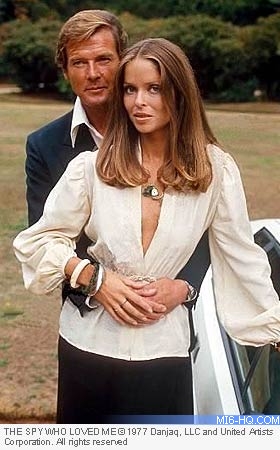
|
|
Even now, thirty years later, I still view the film
as a near-perfect example of what a Bond adventure should
be. Granted, there are some striking similarities between
The Spy Who Loved Me and Director Lewis Gilbert’s
previous Bond film, You Only Live Twice, as Richard Schenkman’s
Bondage magazine pointed out years ago.
For example: Bond
first appears in his naval uniform in the 1967 film and
next appears in the uniform in The Spy Who Loved Me. In
both films he pretends to be married to a beautiful secret
agent from another country and in both films the villain
uses a “kidnapper” super craft to trigger a
nuclear war between the Soviets and the West. Yet, for
all that, the films couldn’t be more different. You
Only Live Twice is a lumbering, clumsily conceived and
(at times) executed affair, while The Spy Who Loved Me
is a truly elegant encapsulation of the series and the
undoubted peak of the Moore era. It eschews virtually everything that marked the preceding
Hamilton-Mankiewicz trilogy (brainless, ineffectual bimbos,
four-letter words and an overall sleazy feel) and instead
concentrates on sheer spectacle. |
In fact, if it hadn’t been for Cubby Broccoli’s
all-out commitment to make this Bond bigger and better than ever,
the franchise might not have survived another indignity like
Diamonds Are Forever or The Man With The Golden Gun. Thanks to
The Spy Who Loved Me, Bond not only survived, he thrived—and
still does thirty years on. Happy Anniversary to Bond ’77!
Gary Giblin is the author of James Bond’s London and Alfred
Hitchcock’s London, as well as the editor of Bond production
designer Syd Cain’s memoirs, Not Forgetting James Bond.
Barry Parker - On The Spy's Gadgetry...
“The Spy who Loved me” came out in August
of 1977, and we are now celebrating its 30 anniversary. It’s
hard to believe that it was that long ago. What was my reaction
when
I first saw it? I’m sure it was awe; with its huge supertanker
and Stromberg’s impressive base of operations, Atlanta,
it was a visually stunning movie. And who could forget one of
the most amazing cars in the entire Bond series: Wet Nellie.
After a somewhat disappointing reception
of the previous Bond film The Man With the Golden Gun,
Broccoli (the producer) took a gamble with this film. He
built the largest stage ever constructed for a movie, and
the gamble paid off. The film was a tremendous success
and it is still one of the favorites (if not the favorite)
of most Bond Fans.
Although Wet Nellie stole the show,
there were other interesting vehicles and some particularly
interesting gadgets. The four gadgets used in the movie
were all quite unique, but none was particularly startling.
Near the beginning Bond got a ticker tape message on his
watch, then as he raced on skis across the Siberian Landscape
pursued by several Russians he got away using his ski pole,
which doubled as a rocket launcher. Anya’s cigarette
was also a little unusual in that the smoke from it knocked
Bond out. I’m not sure, however, why it never affected
her. Finally, there was the cigarette case that doubled
as a microfilm reader. One of the more amusing scenes for me
was when Naomi (Stromberg’s assistant) winked at
Bond from her helicopter just before she tried to do him
in. But Bond was one step ahead of her. Wet Nellie blasted
off a rocket shortly after it hit the water that made short
work of her and her helicopter. |
|
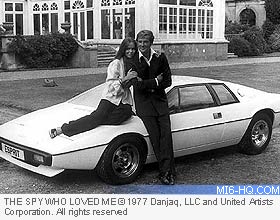
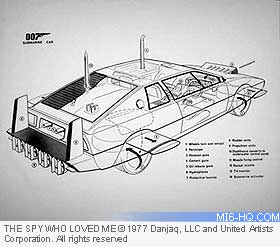
|
This was, without a doubt, one of Roger Moore’s best performances. And
Barbara Bach was quite stunning as Bond’s Russian KGB accomplice; furthermore,
unlike most previous Bond girls she was his equal in many ways. And although
Stromberg was the major villain, it was his henchman Jaws who stole the show.
All in all it was a delightful film.
Barry Parker is the author of Death
Rays, Jet Packs, Stunts, and Supercars: The Fantastic Physics
of Film's Most Celebrated
Secret Agent.
Gareth Owen - On The 007 Stage...
The poster for the tenth film in the official franchise, Lewis
Gilbert's The Spy Who Loved Me, claimed that it was the biggest
Bond of all. With You Only Live Twice's huge volcano set the
producers changed
the studio's skyline, albeit temporarily, but this time they
left a permanent
reminder in the shape of the '007 Stage'.
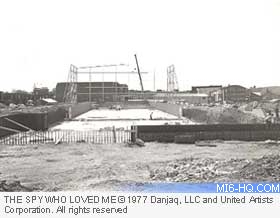
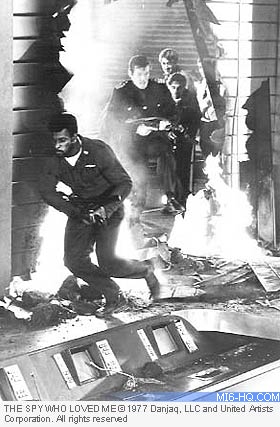
|
|
During early pre-production, the search for a stage
large enough to house three nuclear submarines was underway.
'We saw a lot of people and places,' Broccoli told American
Cinematographer magazine. 'They couldn't promise anything.
We told them we had to dig a big tank to take in the water
and we'd have to have a guaranteed period. It became an
absolute farce. So it appeared to me that it was more sane,
after talking to United Artists, to explore the possibility
of putting up a new stage.'
United Artists took some persuading but Broccoli managed
it. Production designer Ken Adam and young architect Michael
Brown were brought together to design a stage. On the one
hand, it had to be functional for the film, but on the
other it needed to be operational as a stage in its own
right, because EON and Rank (Pinewood's owner) had agreed
it would later be rented out to other filmmakers. This
was the carrot that finally saw United Artists give it
the go-ahead.
But where could it be built within the studio? Peter Lamont
recalls that the idea was to position the new stage over
the existing reservoir on the backlot. 'It only used to
be 75 feet square, but we made it bigger for Thunderball.
When The Spy Who Loved Me came along and we needed the
large stage with a tank, we decided to extend the reservoir
again and build the stage over it.'
Happily, planning consent was swiftly granted and the
stage began to take shape throughout the scorching summer
of 1976. Delta Doric, a building firm from nearby Uxbridge,
took seven months to complete the world's largest stage,
measuring 336 ft by 160 ft with a height of 136 ft. Inside,
the tank measuring 75 ft by 350 ft was the main feature
of Stomberg's Liparus supertanker. |
'It was surprisingly inexpensive to construct:
$1,650,000,' observes Ken Adam, 'and I designed the stage to
be part of the
set with
steel gantries and all that. I don't think UA ever regretted
it as it's always been in use!'
The 007 Stage was officially opened on 5 December 1976. The
ceremony was attended by former Prime Minister Harold Wilson
and leading actors from the film. Several dignitaries from the
Royal
Navy were also
in attendance, plus some top actors including Sir John Mills
and Kenneth More.
Cubby Broccoli's wife, Dana, broke the champagne bottle on the
conning
tower of the American submarine. A brochure was produced to promote
Pinewood's
new stage, with Pinewood's then MD, Cyril Howard, saying, 'The
film
industry has always cried out for a huge stage and now it has
got one.
I sincerely hope that producers will make use of the facility,
which is unique.'
The Spy Who Loved Me was a huge success and Adam was nominated
for an Oscar, losing out to Star Wars on the night. For Cubby
Broccoli it was an extremely significant picture, as there
had been much debate
following his recent split with partner Harry Saltzman as to
whether Bond
would continue. Cubby had now left no doubt in anyone's mind.
For Roger Moore
it was the film that firmly established him as the new James
Bond, and
it remains the actor's personal favourite.
Gareth Owen is author of "The Pinewood Story: The World's
Most Famous Film Studio"
The
views of these columnists and those expressed in this article
are not necessarily those of mi6-hq.com or its owners.